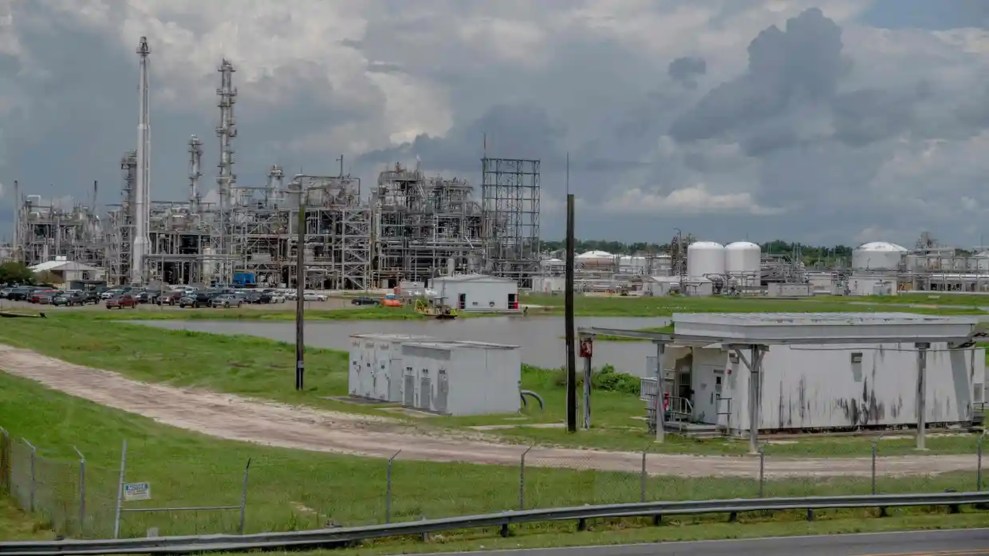
Emily Kask/AFP/Getty Images
This story was originally published by the Guardian and is reproduced here as part of the Climate Desk collaboration.
The Environmental Protection Agency (EPA) has opened a series of civil rights investigations into state agencies in Louisiana to examine whether permits granted in the highly polluted industrial corridor, known locally as Cancer Alley, have violated Black citizens’ rights.
The news, first reported by the New Orleans Advocate, marks further enforcement action taken by the federal agency in the region since the EPA administrator, Michael Regan, visited the area late last year.
The civil rights inquiries will investigate Louisiana’s environment department (LDEQ) over a series of permits approved in both St. John parish and St. James parish and elsewhere in the region, where chronic air pollution in majority Black communities has led to a wave of activism and international attention.
One investigation, targeted at the state’s health department, will examine whether the department violated the rights of Black residents and schoolchildren living near a neoprene facility in St. John “by allegedly failing in its duty to provide parish residents with necessary information about health threats”, and whether the department failed to make recommendations to community members and local government over how to reduce exposure to pollution.
The neoprene facility, operated by the Japanese chemicals firm Denka, is the only location in America to emit the pollutant chloroprene, listed by the EPA as a likely human carcinogen. Residential locations around the site, including an elementary school near the plant’s fence line, often record levels of chloroprene well above the EPA’s lifetime exposure guidance levels.
The investigations will also examine permits related to a proposed gargantuan plastics site in the neighboring parish of St James, operated by the Taiwanese company Formosa, permitted to emit up to 15,400 lbs of the cancer-causing chemical ethylene oxide. That project has been placed on hold during a federal government review.
The investigation will also examine permits for a proposed grain terminal in St. John parish.
The announcement prompted praise from environmental advocates and researchers who pushed the agency to investigate in a series of complaints arguing that the permitting processes are racially biased and fail to fully include feedback from community members.
Robert Taylor, the president of the Concerned Citizens of St. John, told the Guardian: “We need this investigation from the perspective of racial injustice. It is so obvious what’s happening is discriminatory.”
Darryl Malek-Wiley, a senior organizer with the Sierra Club, described the investigations as “a groundbreaking case looking at how LDEQ issues permits and doesn’t identify the impact on African American, low-income communities despite placing them a risk”.
Malek-Wiley said he hoped the investigations would be completed within six months and said the EPA could financially sanction both agencies at the end of its investigation.
A statement from LDEQ said that its permit process is “impartial and unbiased”.
“LDEQ handles all issues with a fair and equitable approach. LDEQ will work with EPA to resolve this matter,” it said.
The Louisiana health department’s general counsel, Steven Russo, said in a statement reported by the Advocate that the department had received the complaint and was “reviewing it closely”.
A spokesman for Denka, Jim Harris, argued there were “no widespread elevated cancer rates in St John the Baptist compared with the state average”, pointing to Louisiana Tumor registry data over decades. Harris accused “environmental activist groups” of “manipulating data and collecting and analyzing it in non-scientific ways”.
Recent studies have pointed to elevated cancer diagnoses in areas around the plant, and EPA data points to a cancer risk rate 50 times the national average in census tracts near the plant.















